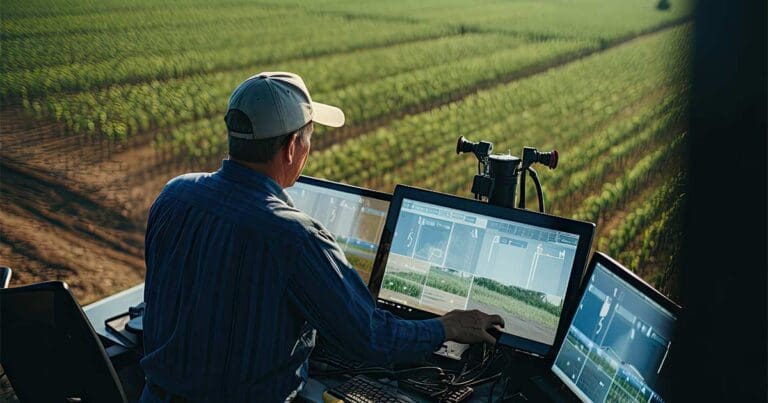The Agricultural Revolution and the Role of AI

How AI is Shaping the Next Agricultural Revolution
Imagine a world where farmers no longer have to rely solely on their intuition and experience to cultivate their crops.
A world where the fields are not only tended to by diligent hands but also by the brilliant insights of artificial intelligence.
This is the promise of the latest agricultural revolution, a revolution fueled by the power of AI.
As we venture into uncharted territory, we unlock the benefits of artificial intelligence in agriculture, shaping the future of smart farming.
Take a few moments to dive into the fascinating world where technology and agriculture converge.
What was the agricultural revolution?
There have been three distinct agricultural revolutions that include the Neolithic Revolution, the Green Revolution, and the third current, Digital Agricultural Revolution.
The first agricultural revolution
The agricultural revolution, also known as the Neolithic revolution, was a period in human history that marked the transition from hunting and gathering to farming and animal domestication.
This shift occurred roughly 12,000 years ago and is considered one of the most significant transitions in human development. It led to a more sedentary lifestyle and laid the foundations for modern civilization.
The second agricultural revolution
The second agricultural revolution included a span known as the Green Revolution and was a period of significant advancements in agriculture that began in the mid-20th century.
This revolution brought about new farming techniques, such as the use of pesticides and synthetic fertilizers, leading to increased crop yields and feeding a growing population.
The third agricultural revolution
The third agricultural revolution began in the late 20th century and continues to this day.
Technological advancements such as precision agriculture, biotechnology, and data analytics have transformed farming practices, increased efficiency, and have lead to what we know as smart farming.
The role of AI in the agricultural revolution
AI helps tackle challenges faced by modern-day farmers by maximizing efficiency and ensuring sustainable practices like precision farming, crop monitoring and management, robotic farming, and predictive analytics.
Precision farming
Precision farming refers to the use of technology such as GPS-guided equipment, drones, and sensors to gather real-time data about soil conditions, crop health, and weather patterns.
This information is then analyzed by AI algorithms to determine the optimal use of resources like water, fertilizer, and pesticides for each specific area of a field.
By only using what is necessary, precision farming minimizes waste and increases yields.
Crop monitoring and management
AI-powered cameras and sensors are also being used to monitor and manage crop health.
These technologies can detect early signs of disease or stress, allowing farmers to take quick action and prevent potential yield loss.
AI algorithms can also predict potential disease outbreaks based on weather patterns and other data, giving farmers the opportunity to take preventive measures.
Robotic farming
With advancements in robotics and AI, we are seeing the emergence of autonomous farm vehicles and robots that can perform tasks such as planting, harvesting, and weeding.
These machines can work around the clock, with precision and accuracy, reducing labor costs and increasing efficiency.
Predictive analytics in farming
Predictive analytics uses AI algorithms to analyze data and make predictions about future outcomes.
In agriculture, this means predicting crop yields, identifying potential pest threats, and determining the optimal planting times based on weather patterns.
This information allows farmers to make more informed decisions and improve overall productivity.
AI implications for agricultural and farm jobs
The AI implications for agricultural and farm jobs include reskilling and upskilling demands, merging traditional farming with tech-savvy roles, and attracting AI talent.
Reskilling and upskilling demands
As AI becomes increasingly integrated into agriculture, there will be a growing demand for skilled workers who can manage and operate these technologies.
This means that traditional farming jobs may require new skills such as data analysis, programming, and machine learning.
Merging traditional farming with tech-savvy roles
The use of AI in agriculture does not mean the end of manual labor.
Instead, we will see traditional farming roles merging with tech-savvy positions. Farmers will need to have a basic understanding of AI and technology to work alongside these advanced systems.
Attracting AI talent
The agricultural industry may face challenges in attracting and retaining AI talent, as the sector is often seen as less glamorous compared to other industries like finance or healthcare.
However, the potential for impact and innovation in agriculture is immense, making it an exciting field for those interested in using AI to solve real-world problems.
The future of AI in the agricultural revolution
The future of AI in the agricultural revolution could include breakthroughs in sustainable farming tech, increased food production and security, adoption of AI in developing countries, and an evolving relationship between humans and tech in agriculture.
Breakthroughs in sustainable farming tech
One of the main goals of using AI in agriculture is to promote sustainable practices.
AI and technology hold the promise of breakthroughs in sustainable farming, with potential innovations such as self-learning irrigation systems, crop disease detection through machine learning, and autonomous robots for precision farming to maximize efficiency and reduce environmental impact.
Increased food production and security
As the world’s population continues to grow, there will be a greater demand for food.
AI has the potential to increase food production and improve global food security by optimizing farming practices, reducing waste, and predicting and preventing crop failures.
Adoption of AI in developing countries
While developed nations may be leading the way in adopting AI in agriculture, there is a growing interest in developing countries as well.
With the rising need for sustainable farming practices in the face of climate change, AI can help resource-limited farmers improve their yields and livelihoods.
Humans and tech in agriculture
The collaboration between humans and advanced technologies like AI will continue to shape the future of agriculture, enabling precision, efficiency, and sustainability.
As we navigate the challenges of food security and climate change, AI will be instrumental in unlocking breakthroughs, optimizing resources, and driving innovations in the agricultural sector.
Embracing AI in the third agricultural revolution
In reflecting on the journey from the First to the Second Agricultural Revolution, it is apparent how significantly technology has revolutionized the field of agriculture.
The incorporation of AI and other modern technologies marks a pivotal moment in this journey, heralding the advent of unprecedented efficiency and precision in farming practices.
As we stand on the precipice of the Third Agricultural Revolution, the role of AI cannot be overstated – its potential to optimize resource usage, increase crop yields, and foster sustainable practices is transformative.
Thus, embracing AI and harnessing its capabilities is not only beneficial but essential for the future of agriculture and for meeting the complex demands of our rapidly changing world.
Looking to hire top-tier Tech, Digital Marketing, or Creative Talent? We can help.
Every year, Mondo helps to fill over 2,000 open positions nationwide.
More articles about hiring and industry trends:
- Burnout vs. Stress in the Workplace: How to Identify & Prevent
- How to Lead High-Performing Teams Without Overworking Them
- Ultimate Year-End Management Checklist for Leaders to Ring in The New Year
- Generative AI & Its Impact on the Job Market: It’s Not All Bad News
- Understanding GenAI and Maximizing Its Potential in Business
- The Future of Recruiting: Top 10 Challenges in Tech and Digital Hiring
- Boomers, Millennials & Zoomers: From Tradition to Transition in the Job Market
- How To Conquer the Top 10 Most Common Recruitment Challenges
- The Rise of Working Moms & the Role of Remote Work
- How to Recruit Top Data Scientists in a Competitive Job Market
- Lessons From Unicorn Companies: Hiring Strategies for Rapid Growth



